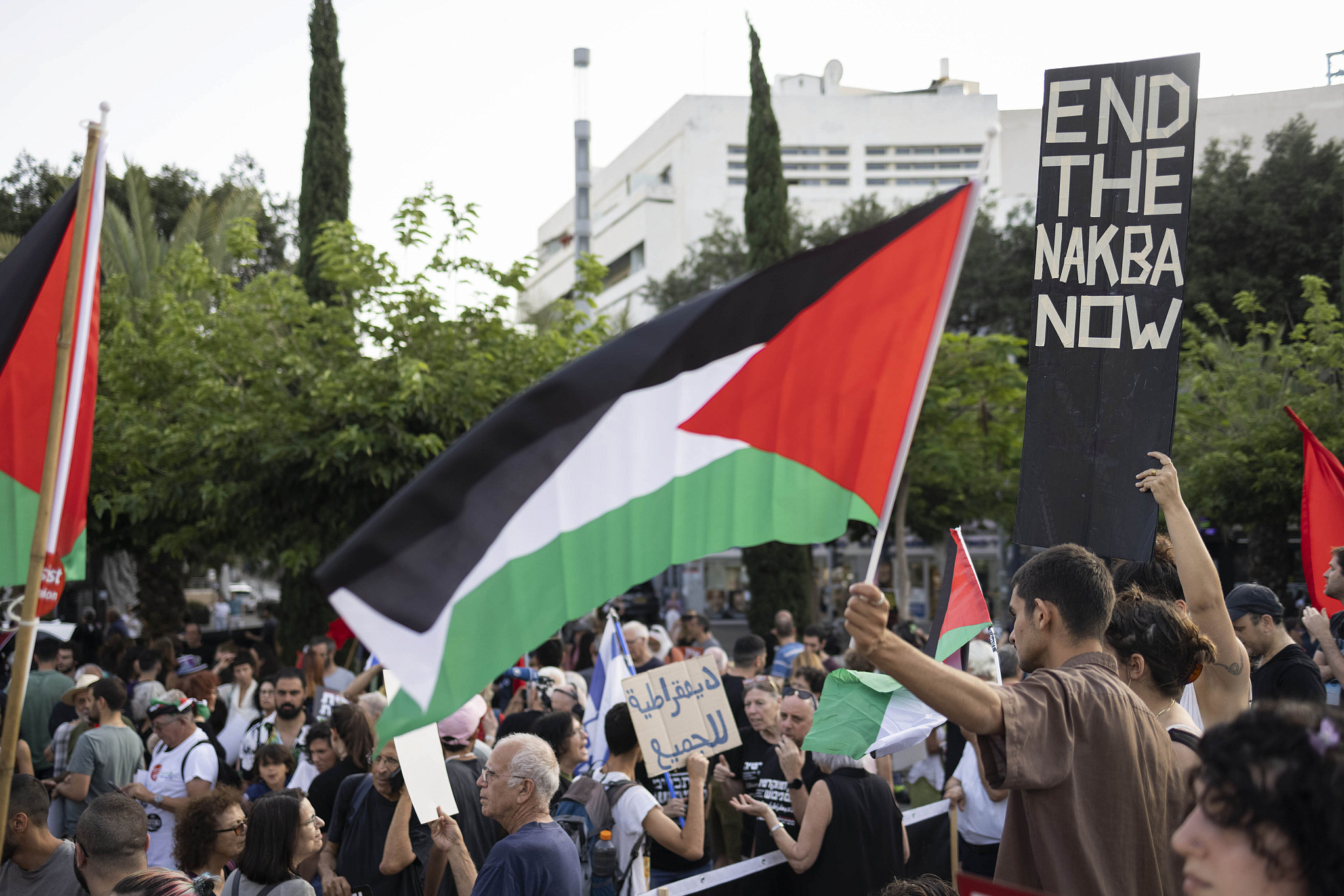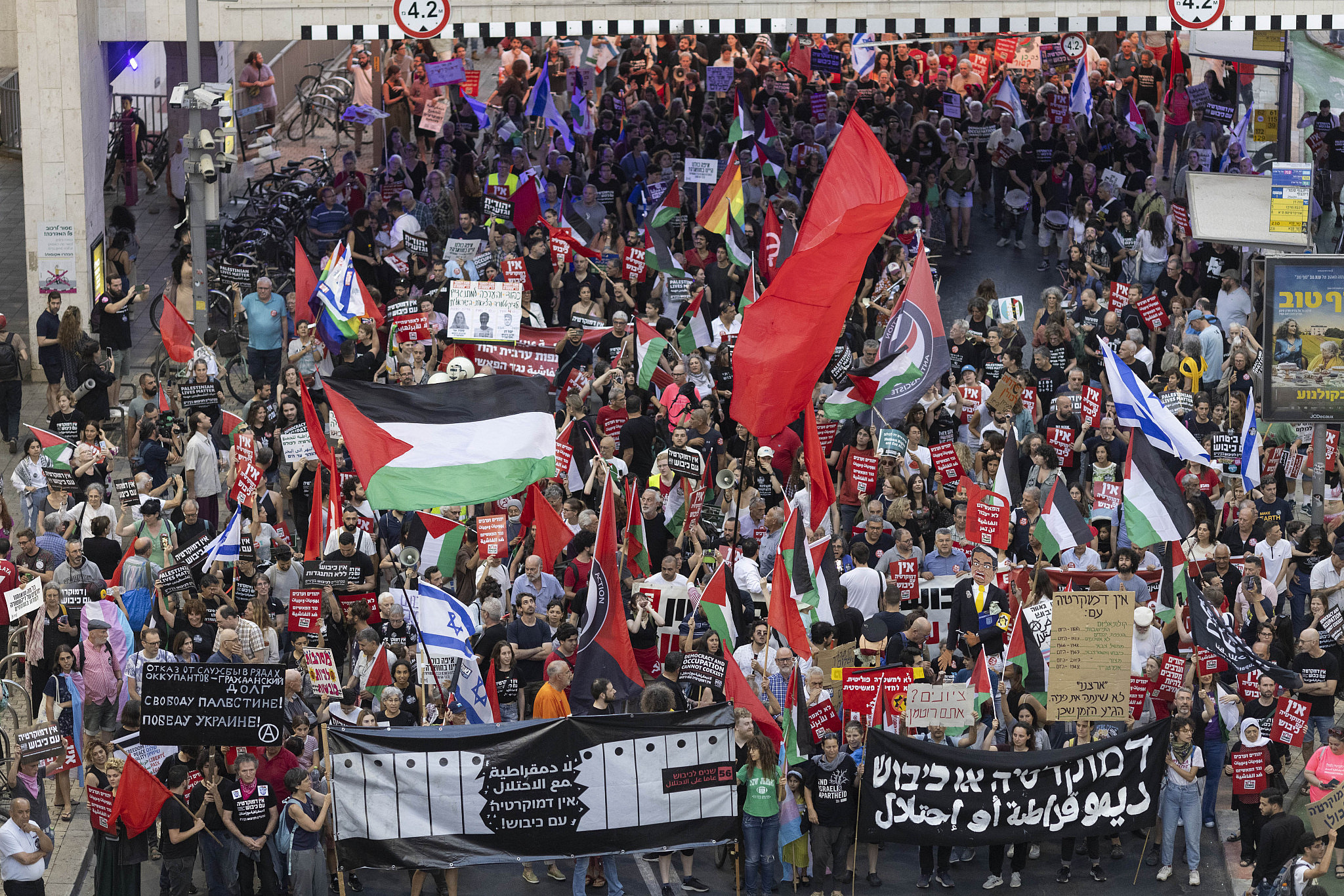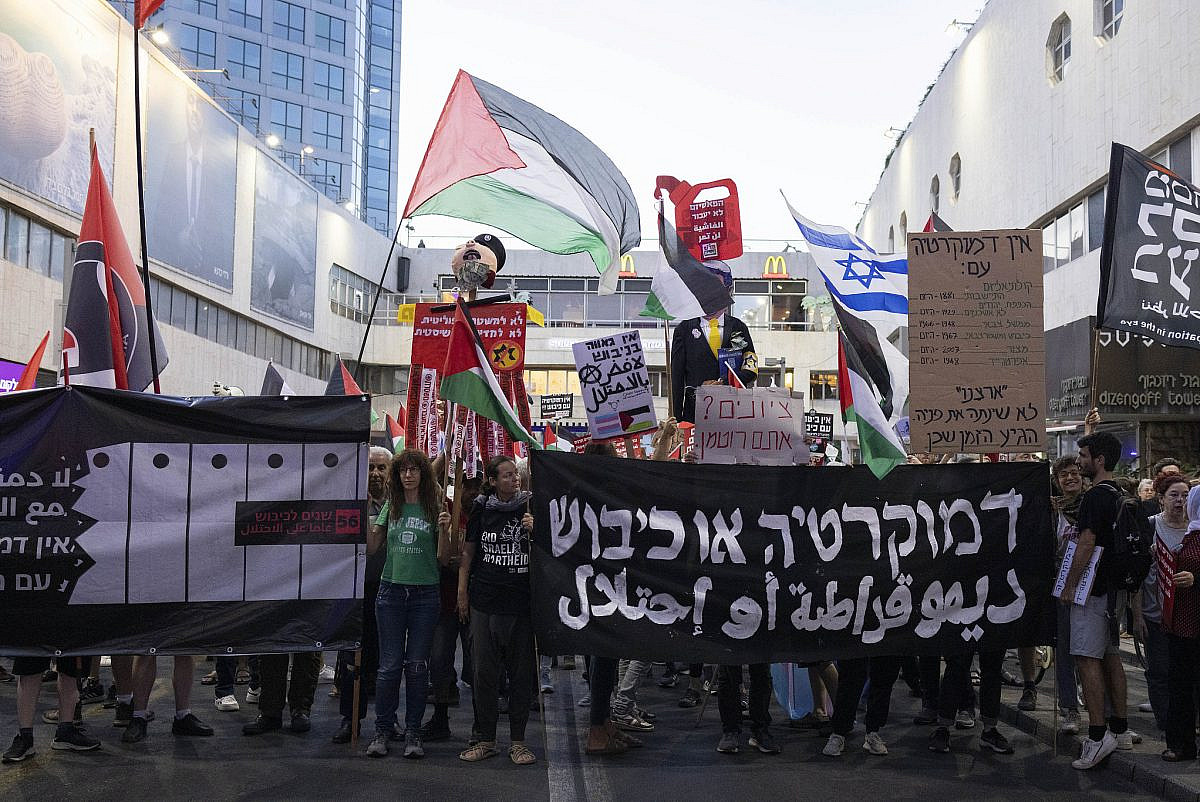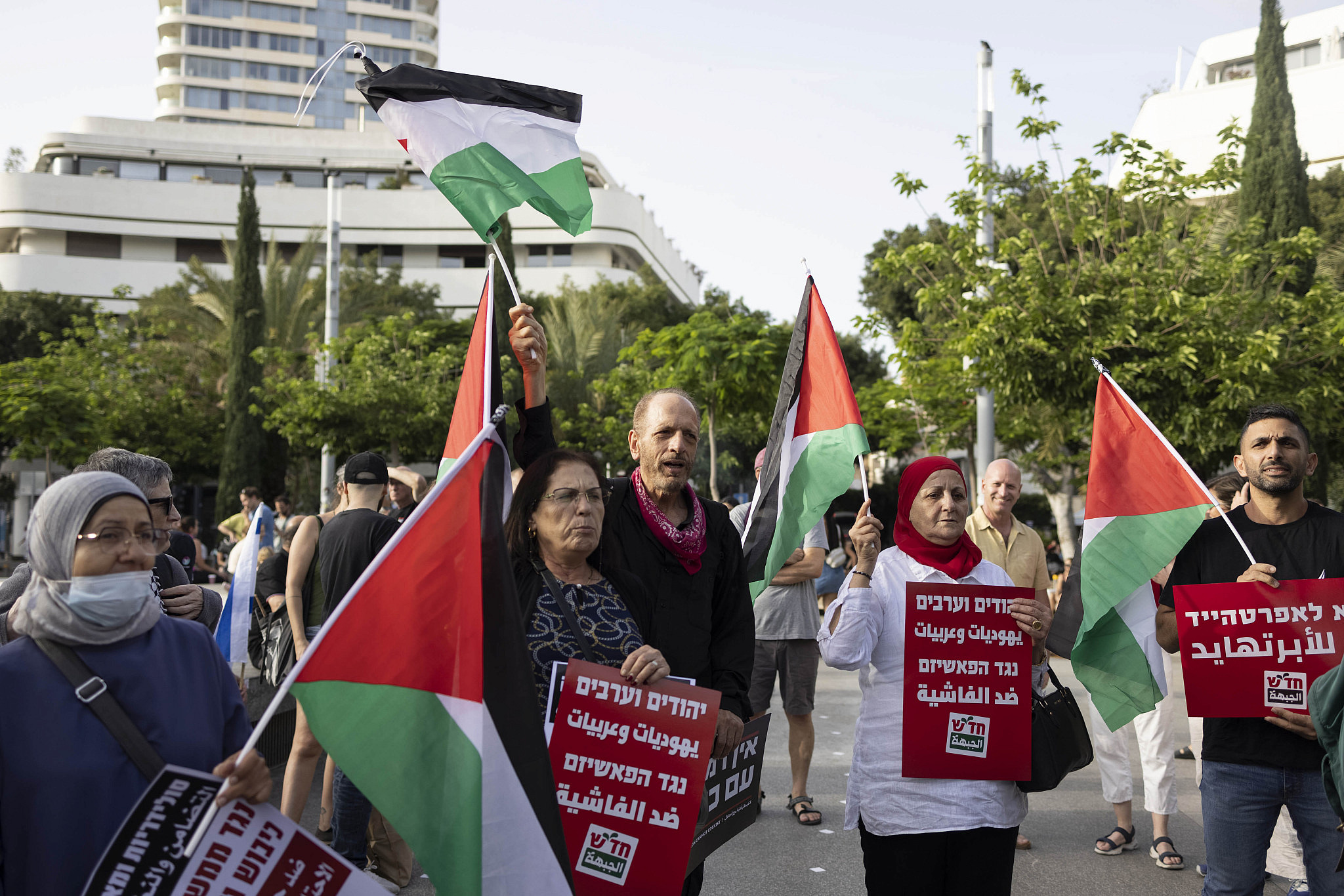The anti-occupation bloc of Israel’s anti-government protests, which have consumed the country for nearly half a year, has been a small but dedicated and growing part of the movement against the far-right coalition ruling the country. But as the most recent demonstration on Saturday showed, the bloc still faces stubborn rejection by the leadership of the mainstream protests, which actively works to silence and distance those they deem a distraction.
The latest rejection occurred when the organizers of the anti-occupation bloc notified the Israeli police of their intention to demonstrate at Dizengoff Square in Tel Aviv, to mark 56 years since the start of the military occupation, before joining the main demonstration on Kaplan Street. The police, in turn, notified the organizers of the mainstream protest, who then refused to allow the anti-occupation bloc to participate as a collective in the main event.
The stated reason for the refusal was that the anti-occupation march was sponsored by the Arab-Jewish communist party, Hadash, supposedly making it a politically-affiliated rather than non-partisan event. But it was immediately clear that the real reason was the focus of the protest — and the hundreds of Palestinian flags that would inevitably be flown. Dozens of organizations took part in the march in addition to Hadash and its youth movement, among them Breaking the Silence, Standing Together, Combatants for Peace, Peace Now, and more. Dozens of Palestinian citizens attended as well, most of them from Hadash, with Palestinian flags in tow.
After being largely sidelined and attacked by the mainstream protesters in the early stages of the movement in January, the anti-occupation bloc gradually became more accepted and integrated into the demonstrations, and even grew. However, in recent weeks, the bloc has once again been treated as a pariah by the mainstream leaders. One participant in the main demonstration a few weeks ago, who was standing off to the side watching people waving Palestinian flags and chanting Arabic slogans, told +972 that he believed the anti-occupation bloc was “ruining [the demonstration] for everyone else.”
Israeli authorities appear to have picked up on this renewed friction. In the lead-up to last week’s demonstration, as it became clear the mainstream organizers had no interest in the anti-occupation bloc’s message or inclusion, a policeman identifying himself as an intelligence officer called the Secretary General of Hadash, Amjad Shbeita, and told him, “You know the other protesters don’t want you there.”

“We came to challenge the protest, not to sabotage it,” Shbeita declared at Saturday’s anti-occupation protest in Dizengoff Square. “We will persist until the protest leadership gives in. The problem is not that we insist on bringing the occupation to Tel Aviv, but that the occupation brought the hilltop youth to power in Jerusalem. The solution is not only to bring down this government and to send the ministers back to the hills, but to return the hills to their rightful owners: the Palestinians.”
Orly Noy, the chair of B’Tselem (and an editor at Local Call, +972’s Hebrew-language partner site), said at the event: “I want to thank all of you on behalf of those who owe you profound gratitude, but who don’t understand it because of their ignorance and arrogance. Those who are not interested in being reminded of occupation and apartheid, that this week marks 56 years since 1967, and that in the last month alone 50 Palestinians were killed — all this might disturb their celebration of ‘democracy.’”
Noy, who is Iranian-born, continued: “Today, people warn us again and again that if we don’t stop the judicial overhaul now, our country will turn into Iran. I want to remind them: when Iranian forces killed a young Kurdish woman, Mahsa Amini, Iranian protesters didn’t say, “Kurdish citizens are of no interest to us, they aren’t part of our people.” No — millions of Iranians flooded the streets under the Kurdish slogan, “Woman, life, freedom,” because the Iranian protesters understand what protesters in Israel still refuse to accept: justice for some is no justice at all, and democracy for some is no democracy at all.”
Artificial separation
After the speeches, the anti-occupation protesters marched on Dizengoff Street toward the King George intersection, where the police blocked the road to prevent them from continuing on. The organizers announced over the loudspeakers that the demonstration “was officially over,” and that now people could continue on their own toward Kaplan Street, where the mainstream demonstration was taking place. Most of the protesters continued as a unified bloc, however, with the same flags and slogans, bypassing the police barricade via Ben Zion Boulevard.

This week, the police were smarter than the mainstream protest organizers and didn’t insist on blocking the anti-occupation marchers, realizing that the officers couldn’t stop them from marching forward as tens of thousands of others were moving towards the area at the same time. And unlike the protests in Jerusalem and Haifa, this time the police didn’t confiscate Palestinian flags.
The Kaplan organizers’ sudden rejection of the anti-occupation bloc is absurd. For more than 20 weeks, the bloc has stood at the intersection of Kaplan and Da Vinci and has grown steadily. Many others look on, intrigued, and a few others get angry; but only a tiny minority actually confronts them or acts violently. The Kaplan organizers have thus proven that they are less open and accepting than the regular protesters, many of whom come to the weekly protests draped in giant Israel flags.
But this rejection is not surprising. The speeches hosted at the Kaplan demonstrations are more conservative, militaristic, and nationalistic than those at any other protest in Israel. While in some other cities Palestinians are regular speakers and mention the words “occupation” and “Palestinian,” the Kaplan organizers have yet to orchestrate anything remotely similar. The next time they wonder “Why aren’t Arabs joining the protest?” they should remember that you can’t ask someone to participate in something that effectively erases their identity.
Most read on +972
Once the protesters arrived at the designated spot by Kaplan and Da Vinci on Saturday, Shikma Bressler, an Israeli physicist and prominent social activist, could be heard over the loudspeakers. “Today marks 56 years…” she said, her voice instantly recognizable to everyone present. For a moment, there was hope among the bloc that she would mention the occupation. But Bressler’s speech moved in a different — and more predictable — direction: “… since the liberation of the Western Wall. The soldiers who took part in it are this week protesting against its takeover by extremists.”
One issue preoccupied Saturday’s mainstream demonstration above all else: the night before, 17 of Israeli protesters were violently arrested and injured by police in Caesarea and Hadera while protesting outside Prime Minister Benjamin Netanyahu’s private home. The detainees were transferred to police stations in the Arab towns of Umm al-Fahem and Jisr az-Zarqa, in the hope that other protesters would not show up there in solidarity. Many protesters were shocked by the image of one of the people arrested, whose eyes were covered by a bandana, an image reminiscent of the way Israeli security forces treat Palestinians in the occupied West Bank.
Yehudah Pollak, who is part of a group of former Shin Bet employees opposed to the government’s judicial overhaul plans, was arrested in Hadera the night before the protest. He wrote about his experience under arrest: “Even though I didn’t resist, the officer was violent, and as I was getting arrested, they handcuffed me extremely tightly (maybe [the intellectual Yeshayahu] Leibowitz was right that in the end it [the occupation] will come back to haunt us).”
Like for many involved in the 2020-2021 Balfour protest movement against Netanyahu, this is the first time many Jewish Israelis are facing the brunt of their state’s police violence, which, until recently, was reserved for others — Ethiopians, Haredim, and most of all, Palestinians. Some of the protesters, including some teenagers, are finally making the connection between the political oppression they are facing with the silencing and violence imposed on Palestinians on both sides of the Green Line. Most Israelis, however, remain oblivious, and like the leaders of the protest movement, are still adamantly trying to maintain the artificial separation between “here” and “there.”
A version of this article was first published in Hebrew on Local Call. Read it here.







